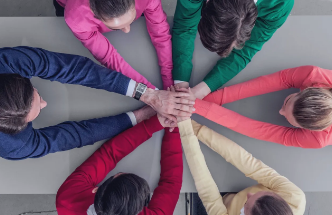By Sivonna Stringham, Resident in Counseling
When someone thinks of the word addiction, what are some terms that come up? Drugs? Struggle? Pointless? Hopeless? Rehab? Survival? Selfish? Breaking up families? While some may never understand motivations for people that become addicted to substances, the truth of the matter is they are still human. Being human means making mistakes and undergoing adversity. Some may turn to substances because it seems like it’s an easy outlet, a solution to a problem, or a way to reduce physical and emotional pain. People who struggle with addiction are often met with judgment and animosity, but what would it look like to meet them with love and compassion?
Addiction is a form of attachment disorder, a misguided attempt to repair the self and ruptured relationships in the past (Flores, 2005). Group therapy is the best practice for treating addictive disorders because social connection and supportive relationships are key to the success of recovery. This speaks to the saying in many self-help circles, which affirms that “We Recover.” We cannot heal in isolation, so we need belongingness and empathy to resolve the source of conflict and distress that addiction fails to fix.
September is National Recovery Month. It started back in 1989 and is annually observed to promote treatment and recovery practices, celebrate those in recovery, and recognize the people who facilitate the process of recovery. Like any major lifestyle change, recovery is not an easy process to go through and it’s important to raise awareness about it and to acknowledge the success of those in recovery and the people who helped them achieve their goals.
Substance Abuse and Mental Health Services Administration (SAMHSA) developed a way to bring awareness to recovery: The Toolkit. The Toolkit utilizes social media to instill hope and offer resources and learning tools to support those in recovery. The Toolkit also helps to emphasize that recovery is not just a mental experience, but also a physical and emotional one as well. In order to make positive change in one area, every part needs to be healed, as the mind, body, and spirit are all connected.
The goal for 2024 Recovery Month is to continue with its message: “prevention works, treatment is effective, and people recover” (youth.gov). Recovery is a long and tough process, not just for those in treatment, but also for their support system. With the help of mental health counseling, substance use rehabilitation, and medical services, there is hope for anyone to recover.
If you want to learn more about how you can get involved and find out about events happening in Recovery Month, check out https://facesandvoicesofrecovery.org/advocate/recovery-month/. The site highlights stories of those in recovery, events across the country, and trainings led by peers.
Resources:
https://guilfordjournals.com/doi/abs/10.1521/ijgp.51.1.63.49730
https://www.naadac.org/national-recovery-month
https://www.samhsa.gov/recovery-month/toolkit

